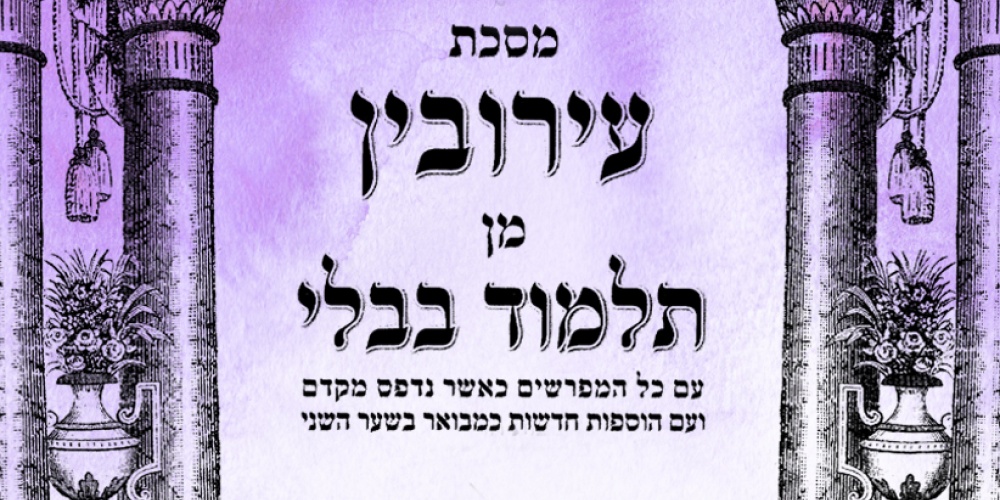
As more and more of our economy runs on credit, as we increasingly pay for purchases with debit cards or even smartphones, the necessity—or even the capability—of using cash is becoming less and less common.
Truth be told, this not a modern phenomenon. “Rabbi Yochanan said: According to the words of the Torah, money acquirers ownership; yet why was it said that one must lift an object [in order to acquire ownership]? It is a [rabbinic] decree, lest he tell him, ‘Your wheat was burned in the attic’” (Eiruvin 81b).
In theory, money is the surest way to buy something. Yet acquiring ownership with cash alone could lead to a situation in which one pays for an object for naught. In case of a fire before delivery, the seller would likely save his object first, leaving the sold item to burn. Our Sages thus ruled that until one takes actual possession, there is no kinyan (transfer of ownership)[1].
The Mishnah (ibid 81a) describes a scenario in which one of the residents of the courtyard is a baker. One of his neighbours pays for a loaf of bread, instructing the baker that when the other members of the courtyard come to take bread for the eiruv, that the bread he just paid for should be used as his portion for the eiruv. As there was no actual possession of the bread—and hence, no transfer of ownership—the Sages ruled that he would not be included in the eiruv.
In explaining the dissenting view of Rabbi Eliezer (that this person would be included in the eiruv), the Gemara notes that “They made it like one of the four times of year”. It is on these four days—erev Pesach, erev Shavuot, erev Rosh Hashanah and erev Shimini Atzeret, and erev Yom Kippur in the Galilee—that the rabbis intervened in the meat market. Animals were expensive (even more so than today) and freezers did not yet exist, so the owner of an animal would be inclined to slaughter that animal only if he knew that there were customers to purchase the bulk of the animal. The sale of meat was thus subject to the laws of supply and demand. However, on the aforementioned four times a year when the consumption of meat is an actual mitzvah[2], we force a shochet to provide meat for all who desire, “even if the ox is worth 1,000 dinarim and the purchaser only has one dinar”. On these four days, a purchaser who paid a dinar would acquire the right to receive his portion from the slaughtered animal, even though he had not lifted the animal.
The Talmud presents two possible explanations as to why this is so. Jewish law recognizes as legally binding the conferring of a benefit to another even without their knowledge, whereas for a legal obligation to be binding, full knowledge is required. On these special four days, eating meat is considered a benefit, despite its great expense. The Gemara assumes that upon receiving payment, the shochet confers the benefit of ownership of the animal to the purchaser. Such benefit, on these special days, does not require a kinyan.
Rav Yochanan offers a slightly different explanation: A kinyan is needed even on these four days. However, due to the mitzvah of eating meat on Yom Tov, the rabbis let the biblical law stand as is, so that money does acquire ownership.
Being able to carry on Shabbat is most definitely a benefit. Rabbi Eliezer holds that the baker can confer ownership to his neighbour; and/or that to enhance the joy of Shabbat, the rabbis followed the biblical law, thereby allowing participation in the eiruv.
While it may not always seem that way, rabbinic law is meant to make life more pleasant for us.
[1] Technically, this provision would allow a purchaser the right to refuse delivery and receive a refund on an item already paid for. While this is quite acceptable in our modern-day economy, such was not the case in Talmudic times, when all sales were final. Thus, the Sages instituted a mi shepara on one who, absent a return policy, pays for an object and then rescinds sometime before delivery. This curse, delivered in public in the synagogue, asks that the G-d who exacted punishment on the generation of the flood should exact punishment on those who renege on their word (4th perek Bava Metziah, mishnah 2).
[2] While many associate Shavuot with the eating of dairy, such is meant to be consumed before and in addition to the eating of meat, which applied no less on Shavuot than on other Yamim Tovim. Tosafot, c.v. arba perakim, explains that no such enactment was made on erev Sukkot as “the whole world is busy with [the building of the?] sukkah and lulav, and they do not have free time to slaughter so much”.



